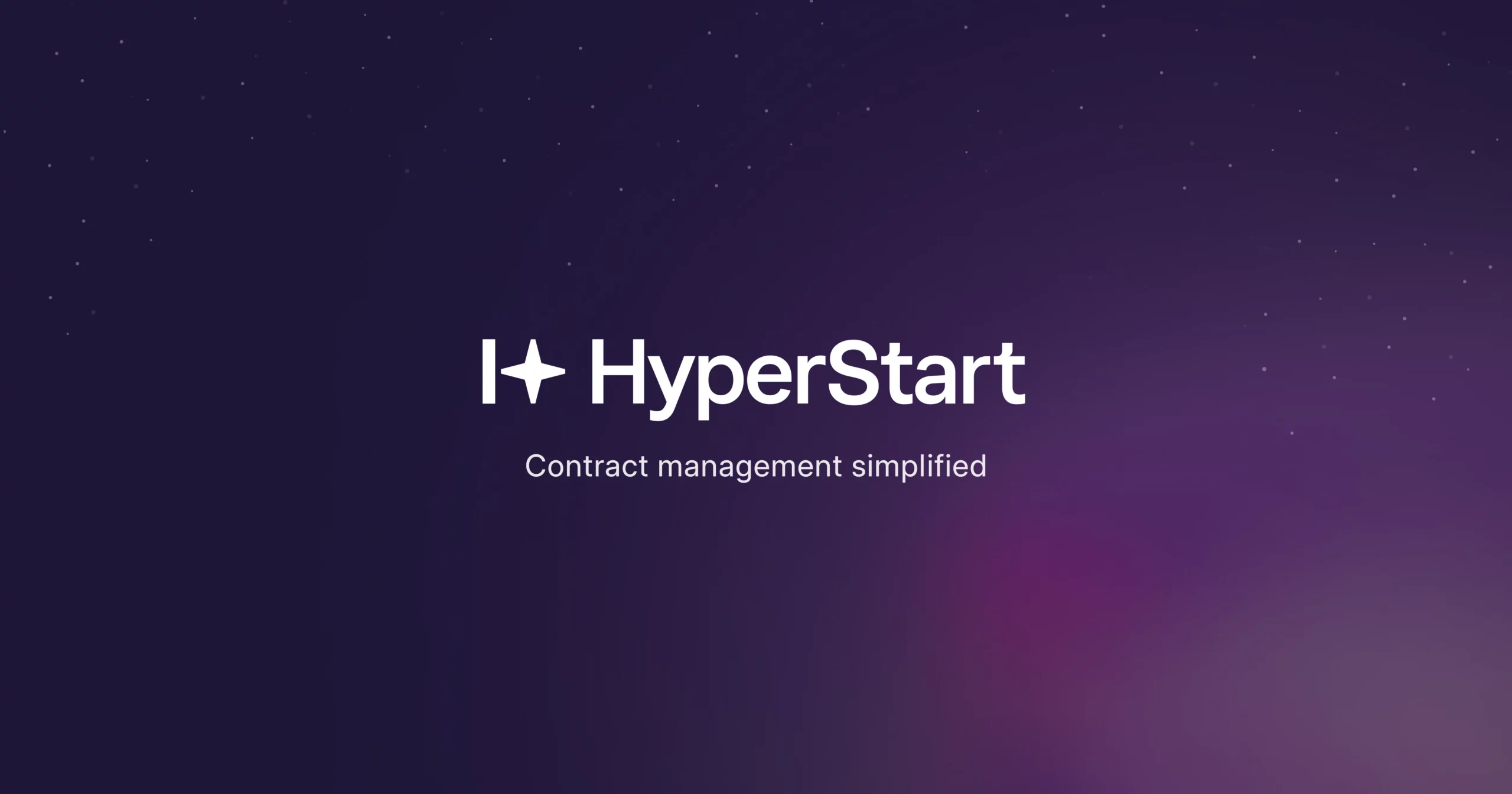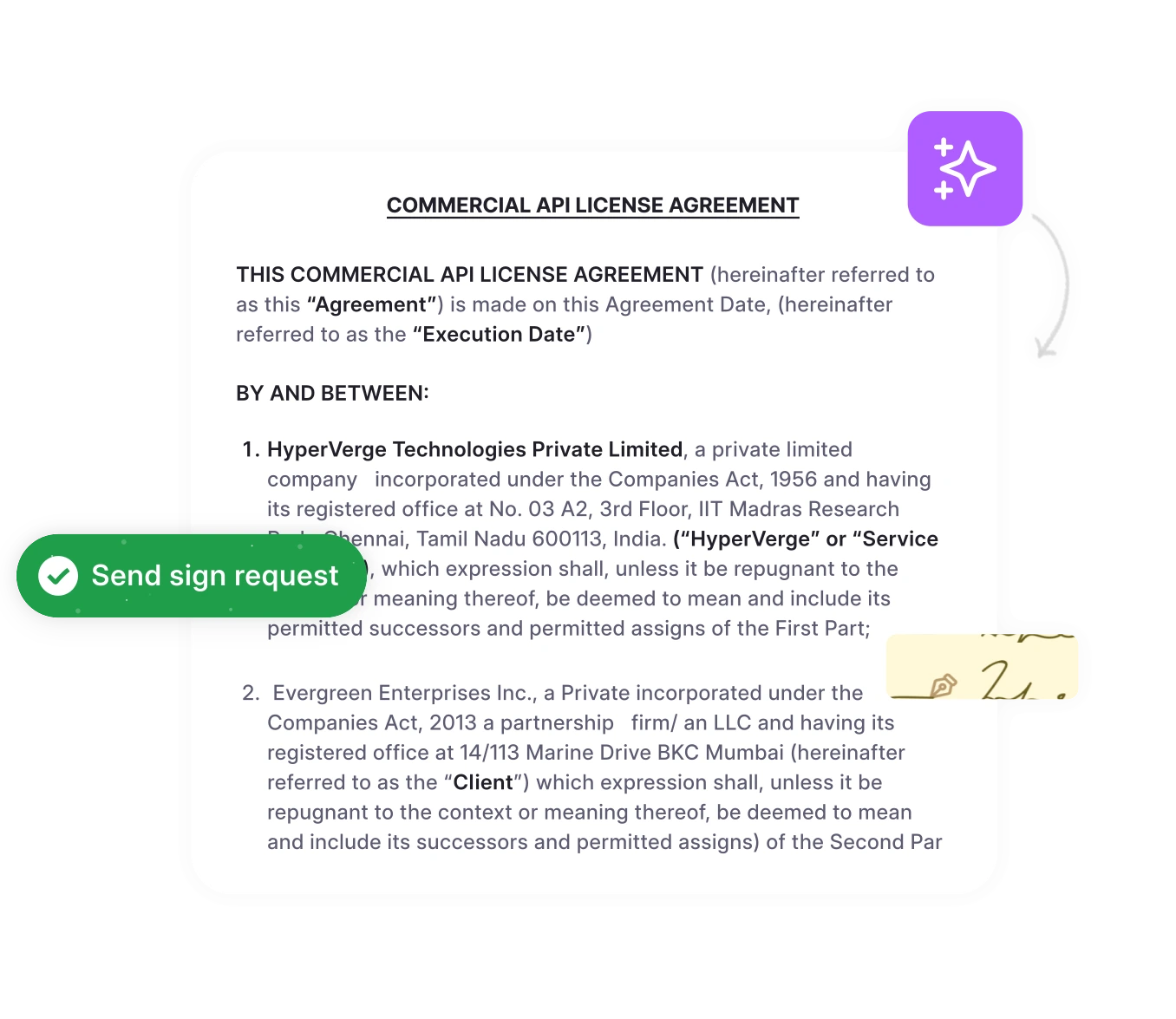Until a contract is signed, your concessions aren’t locked, and your rate can change without notice. Verbal commitments and contractual relationships matter, but the express contract protects both parties.
Until the ink has dried on the counter-signature, it’s not a deal. It’s just a conversation.
This guide will walk you through what an express contract is and the essential elements that make them legally valid. Most importantly, you’ll learn how to manage express contracts at scale without drowning in paperwork.
What is an express contract?
An express contract explicitly states the terms and conditions, either through written or oral communication. Every obligation, right, and expectation is clearly communicated, and all parties involved are on the same page.
Example: You hire a contractor to renovate your kitchen. You sit down and clearly discuss the scope of work, payment terms, timeline, and what materials will be used. With mutual understanding and intent, you both sign a written agreement spelling out these defined terms.
Express vs. Implied contracts: What’s the difference?
While both create legally binding obligations, they’re formed differently.
Spoken vs. Unspoken Agreements
- Express contracts are built on explicitly stated words (written or verbal)
- Implied contracts are formed silently through actions, conduct, and circumstances
Let’s break them down:
| Aspect | Express Contract | Implied Contract |
| Basis of Agreement | Explicitly stated terms (oral or written) | Infer from actions and context |
| Evidence | Clear documentation or witness testimony of stated terms | A pattern of behavior like consistently paying for a service |
| Example | Sales contract with payment and delivery schedules | Ordering food at a restaurant |
Both contracts require mutual agreement. But implied contracts don’t require explicitly agreed-upon terms.
According to Ravinra Lakmal on LinkedIn, contracts typically include four types of terms:
- Express terms – explicitly communicated between parties orally or in writing (payment terms, scope of work, warranties)
- Incorporated terms – terms referenced from another document (like FIDIC construction standards)
- Implied terms – implied by custom, courts, or statute (fitness for purpose, reasonable skill and care)
- Boilerplate terms – standard provisions for legal and administrative aspects (governing law, dispute resolution mechanisms, force majeure clauses)
Read also, 20 Essential Types of Contracts
The statute of frauds requires certain contracts, particularly those involving real estate, agreements lasting longer than one year, or sales of goods over a specific value, to be in writing to be legally enforceable. Oral contracts, on the other hand, have limitations.
Still tracking contracts on spreadsheets?
Hyperstart automates your entire contract lifecycle, so you never miss a deadline or detail again.
Book a DemoKey elements of a valid express contract
For an express contract to be legally sound and enforceable, it must contain several essential elements.
The offer (A clear proposal)
Every contract begins with an offer, a clear proposal from one party to another. The offer must be specific enough that the other party knows exactly what they’re agreeing to.
This typically includes:
- Specific deliverables or services
- Payment terms and amounts
- Timelines and deadlines
- Performance standards
The acceptance (Unconditional agreement to the offer)
Acceptance occurs when the other party unconditionally agrees to the offer. If you respond to an offer by changing terms, it becomes a counteroffer, which the original party must then accept or reject.
The consideration (Something of value exchanged)
Both parties must provide something of value.
Consideration can be:
- Money
- Services rendered (labor, expertise, or work performed)
- Goods (physical products or inventory)
- Promises (like a non-compete clause)
Both parties need “skin in the game.” In employment contracts, the employer provides compensation while the employee provides their time and expertise.
The mutual assent
Did both parties understand the agreement? Everyone must be fully aware of what they’re signing. Use plain language to eliminate ambiguity.
The legal capacity
Everyone signing must have legal capacity. They must be of legal age, of sound mind, and be legally authorized to represent the business.
📋 Checklist for a Valid Express Contract
- Clear offer
- Unconditional acceptance
- Valuable consideration
- Mutual assent
- Legal capacity
- Legal purpose
When these essential elements come together in a written agreement with explicitly stated terms, you have a legally binding express contract.
Everyday examples of express contracts
Express contracts are the backbone of everyday business operations. Let’s look at how written and oral contracts play out in real-world scenarios.
Written express contracts
Written agreements provide the strongest tangible proof of the parties’ intentions and agreed-upon terms. Common types with key terms:
Oral express contracts
While written contracts are preferable, verbal agreements can still create legally binding express contracts in many situations:
- Hiring a freelancer for a short-term project over the phone
- Agreeing to sell your neighbor a lawnmower for a set price
The statute of frauds limitation
Certain contracts must be in writing to be legally enforceable under the statute of frauds. These include:
- Contracts for the sale of land or real estate
- Agreements that cannot be performed within one year
- Promises to pay someone else’s debt
- Sales of goods over a certain value (typically $500 under the UCC)
Verbal agreement to these transactions won’t suffice in court.
Read also, Contract Conditions: Guide for Legal Teams
Managing express contracts
Blue Notary on effective contract management needs:
- Comprehensive documentation
- Professional review
- Clear communication
- Adaptability
These principles apply equally to legal teams standardizing business contracts.
When someone breaks an express contract
Even with explicitly stated terms and mutual understanding, contract breaches happen. The clear terms of an express contract make enforcement straightforward.
Understanding a “breach of contract”
This occurs when one party fails to fulfill their obligations under the agreed-upon terms by non-performance, incomplete performance, late performance, or repudiation
Legal implications and remedies
When a party breaches an express contract, the non-breaching party has several legal remedies:
1. Monetary damages
The most common remedy is financial compensation. The non-breaching party can sue for damages that put them in the position they would have been in if the contract had been properly performed. This might include:
- Direct financial losses
- Consequential damages
- Finding a replacement
2. Specific performance
In certain situations, particularly with unique items or real estate transactions, courts may order specific performance. The court order may require the breaching party to fulfill their obligations and not pay for the damages.
3. Court order prohibiting certain actions
Sometimes the remedy is injunctive relief, a court order prohibiting the breaching party from taking certain actions. This is common in cases involving non-compete agreements or NDAs where the breaching party is using confidential information improperly.
4. Unjust enrichment prevention
If one party has been enriched at the expense of another due to the breach, courts can order restitution to prevent unjust enrichment. This ensures the breaching party doesn’t profit from their violation of the contract.
The explicitly stated nature of express contracts makes these remedies more accessible. When contract terms are clear, proving the breach and calculating damages becomes much more straightforward than with implied contract examples.
Challenges to manually managing express contracts
As organizations scale, managing express contracts manually becomes unsustainable and costly.
- Tracking renewals and critical dates becomes impossible with spreadsheets.
- Ensuring compliance across jurisdictions requires constant vigilance.
- Managing high volumes efficiently between legal, sales, and deal desk teams slows time to revenue.
- Version control across multiple stakeholders and apps is difficult
- Extracting insights from contract data from static documents is not possible.
In contrast, Qapita automated this process, using HyperStart to bulk-upload thousands of contracts in minutes and track key obligations with AI, reducing their contract turnaround time by 75%.
How smart technology can help
Modern contract management software transforms how legal teams handle express contracts. Instead of manual tracking and endless email threads, technology automates business processes while ensuring compliance and reducing risk.
Here’s what contract lifecycle management (CLM) platforms do:
- Automate workflows to create error-free, compliant contracts from pre-approved templates.
- Centralize contracting truth in a repository.
- AI-extract, track, and streamline alerts so you never miss a renewal.
- Extract, visualize, and action analytics insights from your contract portfolio.
- Integrate with business apps you use.
For instance, LeadSquared uses HyperStart’s AI review to analyze lengthy MSAs in under one minute, slashing their initial review time from 4-6 hours and accelerating deal closure.
CLMs essentially help your business scale without increasing headcount.
Closing thoughts
Express contracts power enforceable business relationships.
As contract volumes grow, managing them requires systems and processes that scale. The legal teams that thrive swear by these key principles:
✅ Document everything.
✅ Standardize what you can.
✅ Build flexibility into standard contracts.
✅ Automate contracts to scale.












